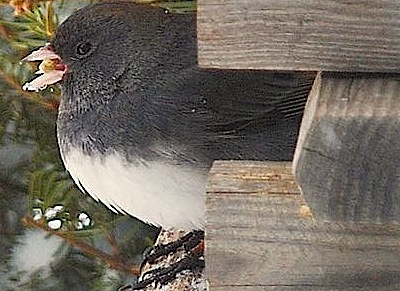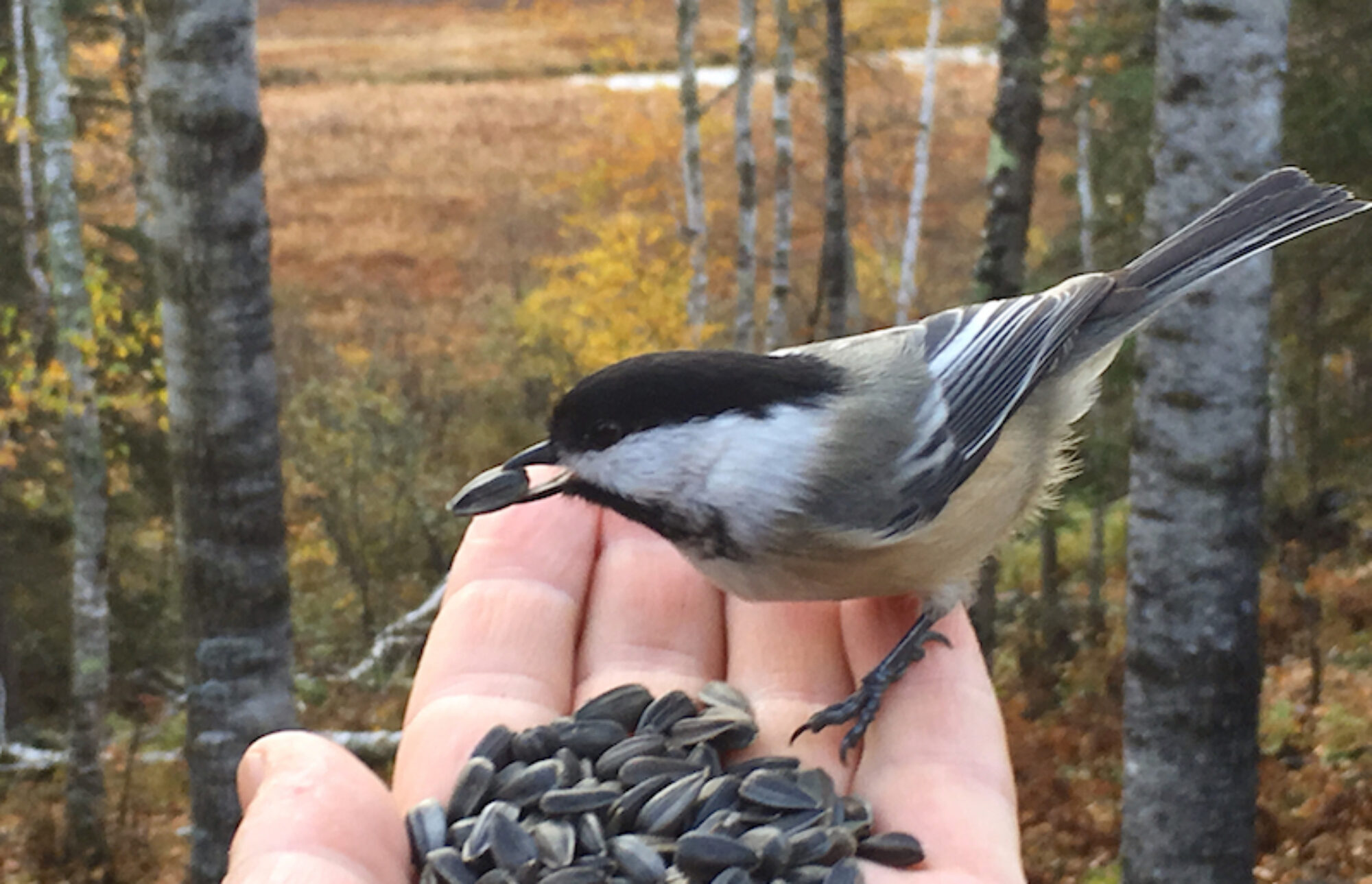
Darked-eyed juncos are migrating through central Iowa on their way to northern breeding grounds. Juncos eat millet sunflower hearts and will nibble on safflower.
By Todd Burras
Lots of people this time of year are looking for phenological occurrences that serve as harbingers of the approach of the warmer weather they rightly expect to find in spring and summer. The lengthening of days in the form of more light, the singing of male cardinals, the budding of trees and bushes, the emergence of cold-tolerant plants, such as crocuses and daffodils, and the arrival of robins and turkey vultures are some of those more obvious signs.
The large numbers of dark-eyed juncos visiting my backyard is one of the signals I’ve come to rely on over the past decade as evidence of the changing seasons.
Juncos have been hard to miss in the past two weeks. Similar in size to finches and most sparrows, a junco’s identity is most easily recognizable by its telltale flashy white “V” tail feathers as they fly about.
While some of these small slate- and charcoal-colored birds spend their winters in central Iowa, in recent days they’ve been showing up in extraordinary numbers as they migrate from more southernly states to their nesting grounds farther north in Canada. They can be seen constantly hopping beneath our feeders searching for millet and sunflower chips to fuel their remainder of their migration journeys, wherever that takes them.
Juncos may lack the verve of gregarious chickadees and the panache of many other colorful songbirds, but winters wouldn’t be the same at our home without them. Year after year they are a staple in the backyard feeding next to the chickadees, white-breasted nuthatches, cardinals and downy woodpeckers that often get more paid more attention by those interested in birds.
Juncos will be gone soon, but hopefully next fall they’ll start showing up here again shortly before the snow flies. Until then, we’ll enjoy the rest of spring and summer without them.
Winged Wonders
While juncos lack colorful panache, neotrocipal birds don’t.
Vibrant-colored hummingbirds, orioles, grosbeaks and buntings will start showing up in Mid-Iowa within the next couple weeks, and there are some things you can do to entice a few of them to visit your backyard and to even perhaps spend the spring and summer in your neighborhood.
Tom and Linda Thomas, owners of Wild Birds Unlimited, will present “Spring’s Winged Wonders,” an in-store seminar, at 7 p.m. Thursday, April 19, at 213 Duff Ave., in Ames. The event is free, but registration is requested to reserve a seat by calling (515) 956-3145.
Clean those birdfeeders
The spring migration is picking up, and if you aren’t already feeding your backyard birds, it’s time to put up the feeders.
Before you do, however, it’s a good time to get those feeders scrubbed and cleaned to eliminate potential disease for your feathered friends.
Wild Birds Unlimited’s annual spring birdfeeder cleaning fundraiser will be from 9 a.m. to 3 p.m. Saturday, April 14, at 213 Duff Ave., in Ames. The cost is $5 per feeder, and proceeds go to Gilbert Boy Scouts Troop 157. Additional donations will be gladly accepted.
Feeders can be dropped off at the store during normal business hours starting Wednesday, April 11, through noon, Saturday, April 14. Cleaned feeders can be picked up late Saturday afternoon or between noon and 4 p.m. Sunday, April 15.
For special dropoff and/or pickup arrangements, call WBU at (515) 956-3145.
Litter and wildflowers
Wildflowers are another sign of spring (and unfortunately so are large amounts of trash), and you’re invited to get outdoors to see some of these delicate beauties while exploring Story County on a couple of guided hikes on Sunday, April 22.
Story County Conservation Board Member Nancy Franz will lead an Earth Day Hike from 1 to 3 p.m., at McFarland Park, 56461 180th St., north of Ames. Pick up litter and discuss how to improve and protect the Earth while looking for wildflowers and other signs of spring during this free hike. Participants must register by 4 p.m. Thursday, April 19.
Also that day, a Story County Conservation naturalist will lead a spring wildflower hike from 2 to 4 p.m. at Robison Wildlife Acres, 29490 632nd Ave., near Nevada. This free hike is of moderate difficulty but suitable for families with small children. Register by 9 a.m. Friday, April 20.
Call (515) 232-2516 to register for either hike.
Todd Burras can be reached at outdoorstoddburras@gmail.com.
